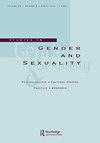新拜物教:走向精神分析与社会科学交叉路口的认识论混合体
Q3 Social Sciences
引用次数: 0
摘要
在本文中,作者讨论了拜物教概念的演变,并提请注意其认识论谱系,其中群体和个人现象相结合,以及其启发式和方法论的使命。在这一历史概述之后,他强调了伯纳德·切尔维特的观察,即弗洛伊德的精神分析过于关注恋物对象的抗创伤功能和性感功能,并指出就此主题的元心理学研究已经停止。在弗洛伊德声称已经达到的“全面阐释”的掩护下,他探索了恋物癖从临床领域消失的政治风险。他提出了人类学家菲利普·里戈特(Philippe Rigaut)提出的“新恋物主义”(new fetishism)概念,这是在新性文化中心进行实地研究的结果,与精神分析中恋物主义的消失背道而驰。作者注意到这一点的重要性,即把拜物教的概念重新发挥作用,以及它如何适应当代生活,同时定义社会方法的局限性。他建议研究人员参与到一个关于恋物癖的跨学科对话中来,而精神分析学家则通过对当前性行为现状的现场观察来面对他们的教条式表述。本文章由计算机程序翻译,如有差异,请以英文原文为准。
Neo-Fetishism: Toward an Epistemological Hybrid at the Crossroads Between Psychoanalysis and the Social Sciences
ABSTRACT In this article, the author discusses the evolution of the concept of fetishism and calls attention to its epistemological lineage, where group and individual phenomena combine, and to its heuristic and methodological vocation. After this historical overview, he emphasizes Bernard Chervet’s observation that Freudian psychoanalysis has focused too much on the antitraumatic function and the erogenous function of the fetish object, and points to the cessation of metapsychological research on this theme. He explores the political stakes of the disappearance of fetishism from the clinical field under the cover of the “full elucidation” that Freud claimed to have reached. He presents the concept of “neo-fetishism” developed by the anthropologist Philippe Rigaut, the result of field work at the epicenter of new erotic cultures, which goes against the vanishing of fetishism in psychoanalysis. The author notes the importance of this putting the concept of fetishism back into play of and how it fits in to contemporary life, at the same time defining the limits of the social approach. He suggests that researchers take part in a transdisciplinary dialogue about fetishism and that psychoanalysts confront their dogmatic representations with live observation anchored in the actuality of current sexual practices.
求助全文
通过发布文献求助,成功后即可免费获取论文全文。
去求助
来源期刊

Studies in Gender and Sexuality
Social Sciences-Gender Studies
CiteScore
0.80
自引率
0.00%
发文量
15
期刊介绍:
Beginning in the final two decades of the 20th century, the study of gender and sexuality has been revived from a variety of directions: the traditions of feminist scholarship, postclassical and postmodern psychoanalytic theory, developmental research, and cultural studies have all contributed to renewed fascination with those powerfully formative aspects of subjectivity that fall within the rubric of "gender" and "sexuality." Clinicians, for their part, have returned to gender and sexuality with heightened sensitivity to the role of these constructs in the treatment situation, including the richly variegated ways in which assumptions about gender and sexuality enter into our understandings of "normality" and "pathology."
 求助内容:
求助内容: 应助结果提醒方式:
应助结果提醒方式:


